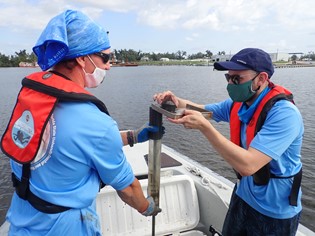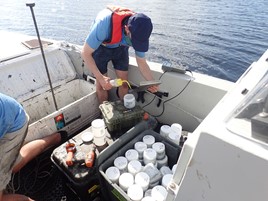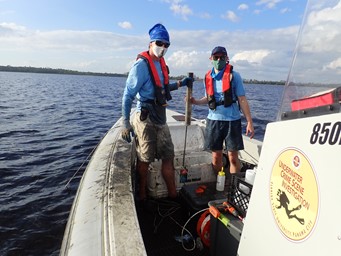 This week, graduate student, Aaron Ridall, lead his first sampling trip for the environmental sampling section of his Ph.D. dissertation work. His research focuses on assessing the seasonal variability in microplastics in coastal sediments and determining what effects proximity to a wastewater treatment plant has on the microplastic concentrations. Wastewater treatment plants may represent major sources of microplastic pollution into the ocean, as microfibers from synthetic clothing may pass through filters and end up in wastewater effluent.
This week, graduate student, Aaron Ridall, lead his first sampling trip for the environmental sampling section of his Ph.D. dissertation work. His research focuses on assessing the seasonal variability in microplastics in coastal sediments and determining what effects proximity to a wastewater treatment plant has on the microplastic concentrations. Wastewater treatment plants may represent major sources of microplastic pollution into the ocean, as microfibers from synthetic clothing may pass through filters and end up in wastewater effluent.
 Assisted by his advisor, Dr. Jeroen Ingels, they collected 90 sediment samples over a course of nine hours. Sampling sites included multiple stations near the Panama City Wastewater Treatment Plant and areas in the bay system that are unlikely to be affected by the wastewater outflow. He is also planning on conducting research at near-pristine sites around the FSUCML to assess how the reference sites in Panama City compare to sites that are devoid of human disturbance.
Assisted by his advisor, Dr. Jeroen Ingels, they collected 90 sediment samples over a course of nine hours. Sampling sites included multiple stations near the Panama City Wastewater Treatment Plant and areas in the bay system that are unlikely to be affected by the wastewater outflow. He is also planning on conducting research at near-pristine sites around the FSUCML to assess how the reference sites in Panama City compare to sites that are devoid of human disturbance. Aaron is extremely grateful to the Florida State Biological Sciences department for allowing field work opportunities during the pandemic, Dr. Ingels for supporting him on his first sampling venture, and the Florida State University Underwater Crime Scene Investigation program team—specifically Adam Wendt (captain) and Darren DeDario—for not only escorting the team out to their sample sites, but also for providing environmental history on the areas within Panama City. Beautiful weather, great company, and a large sample count made this first sampling venture a huge success.
Aaron is extremely grateful to the Florida State Biological Sciences department for allowing field work opportunities during the pandemic, Dr. Ingels for supporting him on his first sampling venture, and the Florida State University Underwater Crime Scene Investigation program team—specifically Adam Wendt (captain) and Darren DeDario—for not only escorting the team out to their sample sites, but also for providing environmental history on the areas within Panama City. Beautiful weather, great company, and a large sample count made this first sampling venture a huge success.
If you are interested in learning more about Aaron’s work, please check his research website where he makes weekly research blog posts on Wednesdays: https://aaronridall.weebly.com/
